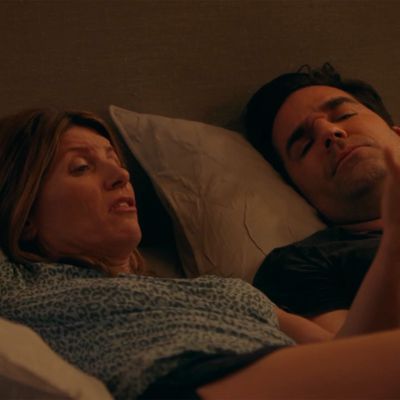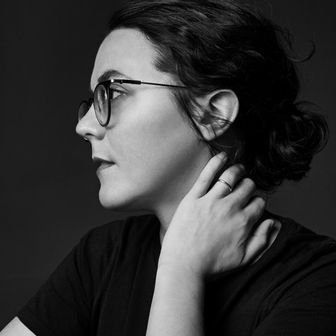
Spoilers ahead for season three of Catastrophe.
In the second episode of Catastrophe’s third season, Sharon and Rob are in bed, trying to move past a marital problem. “I can’t keep saying sorry,” Sharon tells her husband, joking that she’d cut off her hand to make things better. “Well,” Rob says, “I would endorse that if you having fewer hands wouldn’t fuck up my life and make it more difficult.”
Anyone raising young children with a partner will recognize this kind of calculation: If something takes my partner out of the game, what does that mean for me? Where once you may have felt sympathy (or, under the right circumstances, vengeful glee) at your partner’s injuries, now your brain is crowded with urgent logistical concerns. A sidelined partner is a worthless partner, one who cannot help you get the baby up, dressed, fed, and off to day care.
Earlier this year, it seemed like my birthday could be pretty nice: My son was a happy 9-month-old who’d slept through the night for six months already. It was a Sunday; I could nurse instead of pump. Surely, my husband would do his physical therapy. That morning, I awoke hopeful, wondering if we might have a nice lunch with friends. A few minutes later, my husband woke up and sprinted to the bathroom, vomiting so loudly that the dog barked and woke our son.
Was he truly sick, I wanted to know, or just a little queasy, the way I’d been through ten months of pregnancy? My husband looked at me and, without answering, keeled over to retch some more. During our son’s morning nap, I crashed around the house, bitterly preparing food for the week while he lay in bed, having fevered hallucinations and vomiting into a bowl. Every time I cleaned out the bowl, I wondered aloud — at top volume — whether my birthday present from him would be my own violent bout of vomiting. Happy birthday to me, I muttered late in the afternoon, dragging the dog down the block with two bags of laundry and a baby strapped to my chest.
I didn’t really see how horrible I was acting until I came out from putting our son down for the night: There, on the counter, was a box of pizza and a tiny cake bearing our family motto (FACE FACTS). My husband grinned, his face flushed, his eyes watery and semi-crazed. “Thanks for doing everything today,” he said, and politely declined the slice of pizza I offered. Despite spending almost the whole day quarantined in our apartment with him and his germs, I never caught his illness and neither did our son. Happy birthday to me, the biggest baby of all!
Jerky-baby moments like these aren’t always confined to the home or directed toward a partner: On the same episode of Catastrophe, an incident reduces Rob to acting like a baby in public, with a woman who’s not much more than a stranger. Frankie, the couple’s toddler, stands accused of biting a classmate, and Rob and Sharon come together in his defense: There’s no way it was him, they insist to each other; their son is not a biter! But Polly, the mother of the bitten boy, disagrees. When she approaches Rob in the schoolyard to discuss the incident, he blows up at her and bellows his permission for his son to be bitten as retribution.
In a calmer, more generous mood the next time he sees Polly, Rob approaches her car and runs alongside as she frantically starts to drive away: “Please don’t hit me,” she says when he catches up. Before Rob can respond, Polly confesses through tears that she actually thinks Frankie’s innocent. “I mean, look at him,” she says, gesturing to her own son in the backseat. “He’s a savage. I hate him.” In the same breath, she apologizes for what she’s said and puts her face in her hands. Rob launches into an apology too: He’s sorry he shouted at her; her kid, though a liar, is probably fine. “I mean, look at me,” he says. “I’m a mess. I can’t provide for my family. I have diarrhea every day.” He starts a sentence about secrets only to be interrupted by his son, who’s chomping on his dad’s hand. Eyes narrowed with this new knowledge, Polly pulls away, vindicated. “He’s never done that before!” Rob yells after her, shaking his hand in pain and laughing in disbelief.
It’s a nice twist, a funny one that still gets to the heart of something: Parents of young children are often not nice people who sometimes resort to the tools of kids — yelling, running, making a point by causing someone else pain — when interacting with other adults while under duress. Whether or not you’re partnered to that parent, witnessing another parent in their moment of duress comes with conditions; sympathy is fleeting, often conducted with convenience. Polly might have felt pity for the unemployed man confessing his gastric problems. Instead, she saw and clutched onto something rarer — the opportunity to feel a little bit good, for genuine smugness. It’s likely for feelings like those to sour quickly, to turn into guilt and badness, but you know what? The night of my birthday, I ate all the pizza my poor sick husband gave me, then a good amount of cake. Like a baby, I did nothing to deserve such gifts. I feel bad about that, I really do. But they tasted great.





